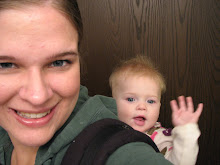I know from experience that finding and marrying someone is not as simple as flipping a switch. If it weren't for Erich, I was prepared to live a life of spinsterhood--I even joked about looking into becoming a Lutheran nun or just getting two cats and watching them become many, many cats who would keep me company in my life of loneliness. I don't even like cats that much. And I can't have been the only person who wondered if I was gay in my long 22 years without a boyfriend. But I don't like girls that much--definitely straight. For me, the right person had to come along. And believe me, I put up plenty of stumbling blocks for Erich to test his worthiness, and he leaped over all of them without blinking. And that is why we are now married.
But if that hadn't happened, would I be getting nosy questions like that now? My instinct says no, but based on the comments on Jezebel, way too many single women are asked why they are single. There could be some cultures (East Coast? UK?) where such personal, invasive questions are considered acceptable conversation. I can't really make a judgment on that; I only know that in my family and culture, people aren't so nosy.
And yet, in reading the article, I found what seem to be very one-sided claims.
The first:
"Marriage: The Good, the Bad and the Greedy," a study published by the American Sociological Association in 2006, found that marriage can lead to a reduced number of social connections for couples outside of their relationship. In turning the marital bond into something of a social oasis, the recently hitched are less inclined to meet with friends.
No kidding? Well, do you think, sociologists, that maybe it's because these people decided to marry the one with whom they like to hang out the most? And they're enjoying being with that person? Plus, it says "recently hitched." Maybe they are actually kinda busy doing things like figuring out yours, mine, and ours; merging finances and figuring out a budget and short-term, medium-term, and long-term goals. There is more to the "honeymoon stage" then just staring at each other, all googly-eyed. And a marriage that will last will also make sure it can stand on its own two feet in this early stage. And lastly, the recently married will probably be thinking/talking about when to start a family. It may just be that the late night drinking and partying is, for the most part, over for this couple. And this is by choice.
And the second one-sided claim:
Or as musician Alesandra Valenzuela, 34, of San Jose, Calif., discovered, they'll take it a step further.
Valenzuela, who is unmarried, said she noticed recently that the behavior of a couple she knew before their wedding shifted when they returned from their honeymoon. In their home stocked with such bridal gifts as a fancy tea set, the newlyweds were suddenly dismissive of Valenzuela.
"They acted all proud of themselves," said Valenzuela, a singer/songwriter. "They acted like they had all of their pieces together and I was stuck eating frozen pizza and living in a house with laundry on the floor. Something changed."
Well, Ms. Valenzuela, I'm not sure evidence like that will hold up in court where your friends stand trial of being more distant since their wedding. Seems mostly a problem with perception, a problem with which I am all too familiar. Proud of themselves? Do you think maybe they're just happy and you're a little bit jealous? On the other hand, if they really think they're happier than you could ever be by virtue of the fact that they have a fancy tea set, there's nothing to be jealous about. Case dismissed.
What all this seems to boil down to is that friendships change when someone gets married. Friendships can change for a lot of other reasons too. The most obvious example is school friendships: I had many friends in high school that I stopped having much in common with when we went off to different colleges. I had even better friends in college who have gone their separate ways--we didn't really stop being friends, but we can't see each other as often in part because of geographical distance, but also because we don't have certain things in common that drew us together, like sharing classes, a major, or a dormitory. Graduation forces these changes and while it's painful, we adjust. Marriage forces change as well, but it's on a much more individualized time frame. Good friends will still make time for each other. But married people will gravitate toward married friends; parents will gravitate toward parents of kids the same age.
"Smug" is in the eye of the beholder. Singletons, please hesitate to judge an attitude as "smug," when it may be just "happy" colored by a little bit of jealousy.
Disclaimer: There are probably a ton of people out there who get married for the sole purpose of being married and smug about it. I don't want to diminish those who deal with these truly annoying people. I speak only from my own experience.





















































